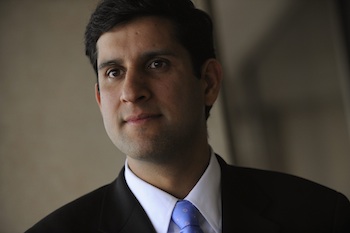Talking social media and broadband caps with Obama’s former chief information officer
Vivek Kundra in conversation with Peter Nowak
**FILE** This Dec. 10, 2008 file photo shows Vivek Kundra, the District’s Chief Technology Officer in Washington, D.C. (AP Photo/Nikki Kahn, The Washington Post) **WASHINGTON TIMES OUT. NEW YORK TIMES OUT. USA TODAY OUT. DC EXAMINER OUT. NO SALES. NO ARCHIVES. NO MAGAZINES. MANDATORY CREDIT**
Share

The other night, I had the pleasure of having dinner with Vivek Kundra, a big name in technology circles by virtue of his being the first ever Federal Chief Information Officer of the United States. Appointed to the position in 2009 by President Barack Obama, his job was to overhaul how the government spends money on technology, a task he did until departing last summer.
Kundra talked at length about how he believes social networks such as Facebook and Twitter are enabling big and meaningful change in the world, from the protests of the Arab Spring to Occupy Wall Street to even Netflix. Social media, he said, has driven all of those phenomena–in the case of Netflix, it was people convincing the company not to spin off its DVD business.
He went further, saying that the current social media upheaval is much more important–from a humanitarian standpoint–than previous technological paradigm shifts, namely mainframe to PC to Internet.
“Social is the only revolution out of all the tech revolutions that is actually changing society, that bleeds into our social fabric,” he said. “Governments are unprepared because they don’t know how to thrive in the social era. Corporations are also all trying to figure out what to do.”
Kundra is also a big believer in cloud services. While he was at the White House, he encouraged the view that employees should be allowed to bring in their own gadgets such as iPhones, Android devices, laptops and so on. Most institutions frown on this sort of thing because they think “bring your own tech” is inherently insecure–that employees will lose their gadget loaded with sensitive company dat–yet Kundra believes the reverse is true.
The best way to beat this, he said, is to migrate all of an organization’s data to the cloud and then let employees access it however they want. That way, the data stays where it’s safe and the IT department doesn’t have to make sure every employee’s device is secure. If the information isn’t stored on the device, there are no worries about losing it.
Whenever somebody mentions the cloud, especially in Canada, the inevitable concerns about infrastructure come up. In the case of the average user, this means things like data caps and broadband upload speeds. With usage limits low and woeful upload speeds, both individual Canadians and businesses are looking like they’re going to once again get the short end of the stick when it comes to migrating to the cloud.
Kundra wasn’t too concerned. He thinks data caps and upload speeds will naturally rise as people prove they want them.
“I don’t necessarily see that as an issue,” he said. “It’s directly driven by the demand curve.”
One thing he didn’t seem to have an answer for was Censusgate from two years ago, where the federal Canadian government axed the long-form census on the grounds that it was an invasion of privacy. As an avowed supporter of open data–or the government freeing the information it gathers to the public–I really wondered how Kundra felt about the issue, especially given that he now sits on an advisory panel set up by Tony Clement. Clement was, of course, the minister at the head of the whole census brouhaha.
Alas, Kundra bowed out of commenting, saying he didn’t know enough about it. It’s possible he really doesn’t, but that’s also a pretty political way out of the question. Given his employment history, he may have learned a thing or two about tact over the years.